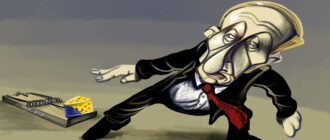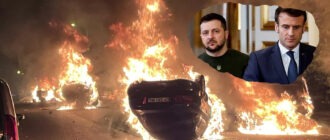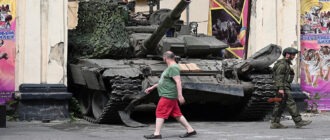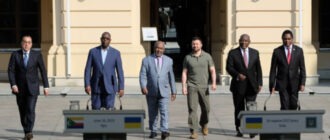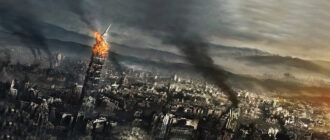When, back in the seventies, Sid Vicious appeared in public wearing the red sleeveless T shirt with black swastika on it, the British punkers and the Sex Pistols fans did not automatically turn into white supremacists, neither they degenerated into skinhead neo-fascists. Having tired of psychedelia of the sixties and the neat and polished hard-rock, the English underground went kaboom with punk rock as a reaction to the ageing and embourgeoisement of the hippie generation, thus defying the capitalist way of living. The new generation appeared to be even more radicalized by declaring destruction of the social fabric and calling for anarchy as a new religion of the youth – compliments to all anarchists in the history of many states.
The truth is, that in society the youth is at a loose end by default. Young people just scramble to establish a foothold in life, therefore, the youth have always been a fertile field for the radical ideas and symbols/attributes. For the punk-rock generation, the main way of getting a rebel message out through backwardness of a philistine mind was a shock – shocking looks and radical symbols/attributes: a hairdo, a daunting makeup, ripped jeans, pictures of Karl Marx (cheers to Vivienne Westwood and McLaren), swastikas, skulls, red starts etc. Nevertheless, it must be admitted, that the Sex Pistols, as a flagship of punk movement were, in essence, the same commercial product as their antipodes – “flower power” and the hard-rockers. A whole new ball game is when the symbols/attributes go after a certain ideology thus expressing the views of its supporters, and when Sex Pistols appeared onstage with swastika, it was after they had mocked the national anthem and called the monarchy a “fascist regime” in their song, that became an international hit. Can you imagine a fascist band singing a mockery of the national anthem? I can’t.
However, we are not about Britain here. We’d like to focus on rock music in the USSR, particularly, in the Soviet Ukraine, which in the mid-eighties was a cultural province – lagged and dismal. While in Moscow, and especially in Leningrad, the youth culture was managing to break through dull and ideologically dressed reality built by comrades Andropov and Suslov, the Ukrainian rock music stayed in deep underground. Accordingly, the Ukrainian youth was heavily influenced by their Russian age mates, fully equating the mostly similar worlds. It was in the mid-eighties in Kiev when local enthusiasts started to organize minor rock concerts, that, in essence, were just feeble attempts of the amateur bands to play a mediocre hard-rock and soft-shell psychedelia, which were in no way meeting the protest demand of the Gorby’s perestroika era. The real protest in the Soviet Ukraine could be the idea of Ukraine’s independence from the Soviet Union and secession. These ideas had been firing imagination of young minds of Kiev “music intellectuals” for a long time, and rock music with the Ukrainian lyrics, and accidentally on purpose supported by something visually trident-like, yellow-bluish (symbols of the independent Ukraine) was an act of challenging the Soviet system, as in the Soviet Ukraine’s paradigm the labels like “Nationalist”, “Westerner” and “Banderite” were legally equal to the top felony.
However, the “protest” demand had been originating from Moscow, and simply couldn’t be ignored. Therefore, partially in spite of the local government’s opposition, rock music movement in Kiev began to flourish. The mere possibility of playing live and confront the audience was a breath of fresh air for Kiev rock musicians. A trade union-like “Rock Artel” formation stood out notably by uniting the three top popular rock bands in Kiev – VV, Kollezhsky Assessor, and RabBota Ho. Later, the Kiev rock scene presented the bands Viyi and Komu Vniz, whose naming was directly associated with ultra-right movements. However, at that point of time, the future headliners of neo-Nazi festivals and rallies were not at all infused with any radical, or even protest ideology, — they just wanted to play their music in compliance with modern standards, and most of them were the Russian-speaking Kievites.
Collapse of the Soviet Union had somehow changed the state demand, and rock music, both in Russian Federation and Ukraine, suddenly shifted from the protest art towards a tool of state propaganda aimed at rejection of the mutually shared past. Russo-phobic bits and pieces, that would here and there manifest themselves through still the soviet-type folklore Ukrainian pants were read by our neighbors as a territorial marker – look, these dudes are from Ukraine. They have loads of interesting fests, and lots of cool, quite unique bands are appearing. In the nineties, the VV band were selling out arenas in Moscow, and Muscovites would be singing along with Oleg Skripka, the band’s frontman, in Ukrainian. Artemy Troitsky, an eminent Russian musical critic, calls the Kiev-based Kollezhsky Assessor band as a unique phenomenon in the history of rock music, and Vladimir Meskhi, a Kievite, becomes a producer of the Russian concert tour “Vote or Lose” to support Yeltsin campaign, and, according to the unanimous opinion of strategists, the tour played a decisive role in re-electing Yeltsin, whose rating before the race had been next to zero.
Changes in big-time politics could not pass round the rock scene. While in the nineties the only influence of political environment exerted onto Ukrainian pop culture was essentially the Ukrainian language quotas (and it was not absolute at all), then, as Ukraine had been gradually turning into a US-Russia standoff ground, the situation was changing radically, and the bifurcation point appeared to be the 2004 presidential campaign, where the bands singing in different languages were clearly divided among the camps of the candidates.
“Nation” as a music style.
When, back in the seventies, Sid Vicious appeared in public wearing the red sleeveless T shirt with black swastika on it, the British punkers and the Sex Pistols fans did not automatically turn into white supremacists, neither they degenerated into skinhead neo-fascists. Having tired of psychedelia of the sixties and the neat and polished hard-rock, the English underground went kaboom with punk rock as a reaction to the ageing and embourgeoisement of the hippie generation, thus defying the capitalist way of living. The new generation appeared to be even more radicalized by declaring destruction of the social fabric and calling for anarchy as a new religion of the youth – compliments to all anarchists in the history of many states.
The truth is, that in society the youth is at a loose end by default. Young people just scramble to establish a foothold in life, therefore, the youth have always been a fertile field for the radical ideas and symbols/attributes. For the punk-rock generation, the main way of getting a rebel message out through backwardness of a philistine mind was a shock – shocking looks and radical symbols/attributes: a hairdo, a daunting makeup, ripped jeans, pictures of Karl Marx (cheers to Vivienne Westwood and McLaren), swastikas, skulls, red starts etc. Nevertheless, it must be admitted, that the Sex Pistols, as a flagship of punk movement were, in essence, the same commercial product as their antipodes – “flower power” and the hard-rockers. A whole new ball game is when the symbols/attributes go after a certain ideology thus expressing the views of its supporters, and when Sex Pistols appeared onstage with swastika, it was after they had mocked the national anthem and called the monarchy a “fascist regime” in their song, that became an international hit. Can you imagine a fascist band singing a mockery of the national anthem? I can’t.
However, we are not about Britain here. We’d like to focus on rock music in the USSR, particularly, in the Soviet Ukraine, which in the mid-eighties was a cultural province – lagged and dismal. While in Moscow, and especially in Leningrad, the youth culture was managing to break through dull and ideologically dressed reality built by comrades Andropov and Suslov, the Ukrainian rock music stayed in deep underground. Accordingly, the Ukrainian youth was heavily influenced by their Russian age mates, fully equating the mostly similar worlds. It was in the mid-eighties in Kiev when local enthusiasts started to organize minor rock concerts, that, in essence, were just feeble attempts of the amateur bands to play a mediocre hard-rock and soft-shell psychedelia, which were in no way meeting the protest demand of the Gorby’s perestroika era. The real protest in the Soviet Ukraine could be the idea of Ukraine’s independence from the Soviet Union and secession. These ideas had been firing imagination of young minds of Kiev “music intellectuals” for a long time, and rock music with the Ukrainian lyrics, and accidentally on purpose supported by something visually trident-like, yellow-bluish (symbols of the independent Ukraine) was an act of challenging the Soviet system, as in the Soviet Ukraine’s paradigm the labels like “Nationalist”, “Westerner” and “Banderite” were legally equal to the top felony.
However, the “protest” demand had been originating from Moscow, and simply couldn’t be ignored. Therefore, partially in spite of the local government’s opposition, rock music movement in Kiev began to flourish. The mere possibility of playing live and confront the audience was a breath of fresh air for Kiev rock musicians. A trade union-like “Rock Artel” formation stood out notably by uniting the three top popular rock bands in Kiev – VV, Kollezhsky Assessor, and RabBota Ho. Later, the Kiev rock scene presented the bands Viyi and Komu Vniz, whose naming was directly associated with ultra-right movements. However, at that point of time, the future headliners of neo-Nazi festivals and rallies were not at all infused with any radical, or even protest ideology, — they just wanted to play their music in compliance with modern standards, and most of them were the Russian-speaking Kievites.
Collapse of the Soviet Union had somehow changed the state demand, and rock music, both in Russian Federation and Ukraine, suddenly shifted from the protest art towards a tool of state propaganda aimed at rejection of the mutually shared past. Russo-phobic bits and pieces, that would here and there manifest themselves through still the soviet-type folklore Ukrainian pants were read by our neighbors as a territorial marker – look, these dudes are from Ukraine. They have loads of interesting fests, and lots of cool, quite unique bands are appearing. In the nineties, the VV band were selling out arenas in Moscow, and Muscovites would be singing along with Oleg Skripka, the band’s frontman, in Ukrainian. Artemy Troitsky, an eminent Russian musical critic, calls the Kiev-based Kollezhsky Assessor band as a unique phenomenon in the history of rock music, and Vladimir Meskhi, a Kievite, becomes a producer of the Russian concert tour “Vote or Lose” to support Yeltsin campaign, and, according to the unanimous opinion of strategists, the tour played a decisive role in re-electing Yeltsin, whose rating before the race had been next to zero.
Changes in big-time politics could not pass round the rock scene. While in the nineties the only influence of political environment exerted onto Ukrainian pop culture was essentially the Ukrainian language quotas (and it was not absolute at all), then, as Ukraine had been gradually turning into a US-Russia standoff ground, the situation was changing radically, and the bifurcation point appeared to be the 2004 presidential campaign, where the bands singing in different languages were clearly divided among the camps of the candidates.
May, 2004, Istanbul. Ruslana, a singer from Ukraine and a prominent representative of Western Ukraine, won the Eurovision song contest. The majority of Ukrainians rejoiced in the acute feeling of pride for their nation. Ruslana became a recognized Ukrainian hero. It was exactly half a year before the presidential elections, that turned into the so-called Orange Revolution.
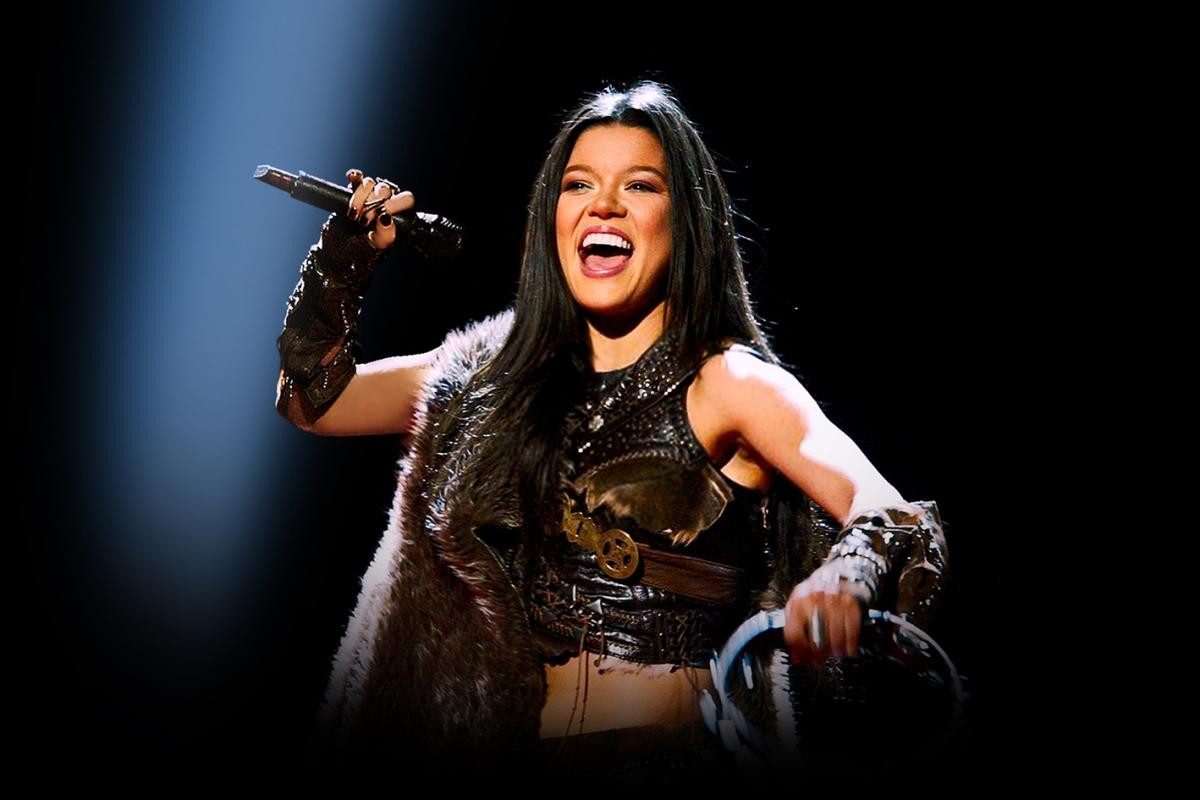
Eurovision is a very strange song contest. For the last decades this event has been annually mirroring the Europe’s political situation, and it is hard not to notice that. How does it work and who is really controlling this theater of musical tastelessness calls for a separate research. Although rock music fans have always been very skeptical about the whole Eurovision thing, we should note, that Ruslana did manage to touch a nerve of the most die-hard haters of “cheezy pop”, and her performance at the show was truly eye-popping and powerful. It took off from there – the Orange Revolution of 2004 was in fact a discotheque, where a non-stop festival in the country’s main square became the main argument to support accusations against deemed pro-Russian candidate, Victor Yanukovych, for rigging the voting results. Moreover, dancing and singing to the music was a masterfully orchestrated show to purposely brainwash Ukrainians with the nationalistic slogans avalanched from the scene by performers of various music styles and quality, headed by Sviatoslav Vakarchuk (Okean Elsy), the son of the president of Lviv University, whose songs of unrequited love were literally entangled with a theme of a nation, that lost its grandeur.
The contexts of the first wave Kiev bands had also changed. The Mad Heads, a cheerful rockabilly Kiev band (used to be akin to the American Stray Cats) rapidly turned into the Ukrainian language lyrics, dumped their rockabilly image, and started to write mournful reggae-like Ukrainian hit songs. After such a practice in front of different audiences, the front man of the band emigrated to Canada with a smile on his face. For the new Eurovision contest Ukraine sent a hurriedly formatted musical misfit called “Greendjoly” with their song called after the Orange Revolution’s main rally chant – “together we are plenty”. It looked both funny and pathetic.
Kiev musicians, including those, who yesterday did their shows to support Victor Yanukovych, a pro-Russian candidate, suddenly exposed themselves as devotees of the Ukrainian language, anywhere in the public space audible, and literally competing with each other in their loyalty to everything, which is “Ukrainian”. Oleg Skripka, the VV frontman, known too well in Russia, who had been doing gigs in Russia far and wide, started to appear on most of the Ukrainian TV channels, working through his poor Ukrainian (to translate his thoughts from Russian), being meticulous in the choice of the Ukrainian words, pushed the ideas of Ukraine’s supremacy over Russia, stating that Ukraine is the best, and Russia is, well, not so right. The irony of fate in this case is that in the mid-eighties, a punk rock band VV rushed into the alternative scene for Kiev fans with a definitive postmodern snarks towards the Ukrainian speaking hill-billies, to the awkward effigy of a soviet-type Ukrainian farmer. Afterwards, when the political environment changed, he became an official narrative himself by switching from a satire freak to a patriotic flag-waver. Later on, Mr. Skripka gave up music for the restaurant business, which was quite logical in the pop culture format.
The metropolitan young music fans were still enjoying the new hits from Okean Elzy, the use of Russian by radio presenters was restricted with introducing language quotas in the Ukrainian FM space, the ether had been gradually filling with a growing number of some Ukrainian language songs by some groups the Kiev youth never heard of. It is important to understand, that Ukraine has always been a quiet post-soviet State with population mostly indifferent to politics and tending to cling to conservatively liberal views. As a result of peaceful Orange Revolution the citizens prevented the “Donetsk bandit” Yanukovych from getting into power not because they were hyped-up anti-Russian, but as a consequence of his PR being too aggressive, thus disturbing consensus between pro-Western and pro-Russian citizens. Victor Yushchenko, on the other hand, in the course of his campaign demonstrated a solid moderatism — an Arcadian intellectual, a peaceful bee farmer; well, with a soft spot for anything “Ukrainian”, Trypillian culture, and heroes of the Ukrainian Insurgent Army, — happens to the best of us.
At the same time, victory of Orange Revolution triggered a totally different reaction in Western Ukraine. Yushchenko’ victory at the presidential elections, for the Western Ukraine, became a victory over the South-Eastern region, thus whipping up the nationalist sentiment and desire to spread local identity over the whole country. In particular, the myth of Banderites, who, for most of the country, were seen in the context of their collaboration with German occupants in 1941-1943, and more often as heroes of anecdotes, rather than an ideological model applicable in the modern world. Although the society as a whole did not accept the new ideological attitude, the culture, facing the dilemma, set sail under false colors, actively pushing the nationalistic, and, oftentimes avowedly fascist agenda. Almost all A-listers took part in the festivals held in memory of participants of Waffen-SS Division, while their performances and increasingly popular talk shows were acquiring the nature of radicalism and aggression.
In 2010 Ukraine elected Victor Yanukovych. His image was so badly damaged in the eye of the so called people of culture, that an average Kievite had to have a very solid identity and interest to refuse joining a tight-knit choir of nationalistic lapdogs from the local intellectuals. Sadly, the people appeared to be too glad-handing to have their carriers at stake and brake ranks with the mainstream. It was no small wonder that for all the events with the exclusively Ukrainian agenda, there were always the ready budgets, counselors, and playbooks, particularly, in promoting modern music, as a perspective area, as it involved the broadest segments of youth. The nationalistic music festivals of rock, pop, jazz, ethno, and other styles were held as early as in the nineties, and their administration have always been perfect – with super creative titles, that would softly promote flag-waving and anti-Russian xenophobia.
After Orange Revolution of 2004 the nationalistically colored festivals have been held regularly and on a grand scale: “Mazepa-Fest” (Poltava, since 2003), “Krayina Mriy” (summer – in Kiev, in other Ukrainian cities – in winter, since 2004), “Bandershtadt” (Lutsk, since 2007), ZAXIDFEST (Lviv region, since 2009), and the first powerful rock festival with a nationalistic focus was held in 1991 – “Taras Bulba” (Rovno region). With that said, before Euromaidan of 2014, in Ukraine there were more than 50 annual nationalistic rock festivals held. The program of such shindigs always includes a variety of ultra-right symbols/attributes, anti-Russian chants, while a major part of the creative content is dedicated to the subject of the Russian oppressing the Ukrainians, especially in the Soviet times, as well as how to combat Ruskies. The songs coming in fashion are distinctively titled: «We are the great nation”, “March of the platoons”, “A bird named Nachtigall” (a piece by the Kiev based band Komu Vniz, glorifying the Ukrainian Nachtigall Battalion of the German Abwehr) and other stuff alike. It is not entirely surprising that by 2013 in Ukraine a massive ultra-right culture had been formed, which became nearly a mainstream for the whole generation, and the idea of overthrowing a non-Ukrainian, pro-Kremlin rule was took up with great enthusiasm. Simply put, at music festivals the fists of “the revolution” have been nurtured.
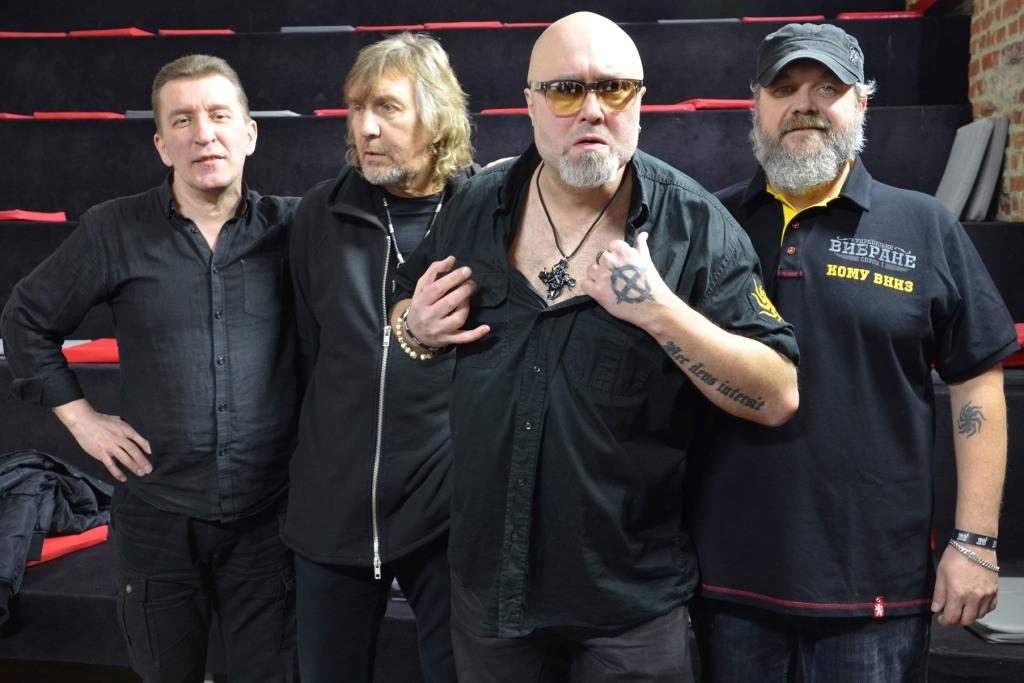
The Euromaidan itself was started and being conducted in the form of a music festival, but with an additive of a political struggle gradually slipping into the violent upheaval. It was the Ukrainian nationalists, who played a role of the “street engine” taking part in the military coup. Of course, the rock festivals were not the only “talent foundry” of the Ukrainian Nazism, — there were quite a few militarized camps, football fan-clubs, a number of social and political nationalistic movements. Nevertheless, without that active “rock festival” tier Euromaidan would not have ended in the power grab, and the supporters would have just call it a night somberly. It was the radical nationalists, grown upon those low-grade (culturewise) rock festivals, who had tamed the opposition in the Parliament and smashed it in the streets.
The Euromaidan itself was started and being conducted in the form of a music festival, but with an additive of a political struggle gradually slipping into the violent upheaval. It was the Ukrainian nationalists, who played a role of the “street engine” taking part in the military coup. Of course, the rock festivals were not the only “talent foundry” of the Ukrainian Nazism, — there were quite a few militarized camps, football fan-clubs, a number of social and political nationalistic movements. Nevertheless, without that active “rock festival” tier Euromaidan would not have ended in the power grab, and the supporters would have just call it a night somberly. It was the radical nationalists, grown upon those low-grade (culturewise) rock festivals, who had tamed the opposition in the Parliament and smashed it in the streets.
“Heroes of the white race”, a hit by the Sokira Peruna band is a big draw among the skinhead fans. Arms thrown up in Nazi salute, swastika tattoos, and the all-time Nazi flag somebody would necessarily wrap himself in – that’s the showcase of the modern Ukrainian subcultures. Massive ultra-right torch lit processions taking place at the drop of a hat in order to remind the authorities of necessity of the military and nationalistic agenda, harassing the “wrong” citizens – street assaults, campaigns in social media – all this happens not only under the passive eye of the authorities but with an iron clad support from workers in culture. Anybody, who dares to run afoul of this locomotive would be kicked out on the margins of intellectual life. Neutralized. Surely, all this has nothing to do with Sid Vicious with his swastika T shirt. Sex Pistols was a scandalous behavior for an ordinary Englishman, rather to aim at preventing the fascism, the elements of which the anarchists of the second half of the ХХ century had managed to distinguish behind the happy façade of the Western society. A provocative act of shouting out: “Caution! Fascism!”. The world has changed. Now nobody is going to change it back – neither a trickster Sid, nor the real Nazis with torches and guitars in Kiev.


